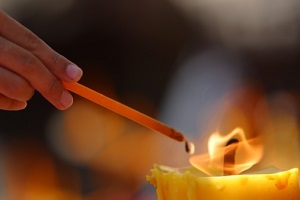 We humans like things to stay the same. Even if we are open to change, change can be very difficult. There is nothing more disruptive than the death of someone you love, someone whose existence is part and parcel to your own. When those people die, we are left floundering. That person may be your child, your husband or wife, your companion, your friend, your sister, or your brother. The depth and breadth of your grief depends on the connectedness you feel to the person who has died—your spiritual, emotional, or physical connectedness, and often, your perception of your very existence. The more intertwined your life with a person, the more affected you are by your experience of grief when that person dies.
We humans like things to stay the same. Even if we are open to change, change can be very difficult. There is nothing more disruptive than the death of someone you love, someone whose existence is part and parcel to your own. When those people die, we are left floundering. That person may be your child, your husband or wife, your companion, your friend, your sister, or your brother. The depth and breadth of your grief depends on the connectedness you feel to the person who has died—your spiritual, emotional, or physical connectedness, and often, your perception of your very existence. The more intertwined your life with a person, the more affected you are by your experience of grief when that person dies.
When someone you love dies, you experience deep, soul-wrenching pain. Your life changes. You change. Everything changes. Things are very different than you thought they would be. Yes, it hurts terribly. But there is nothing wrong with you. Grief is not pathological. Grief is normal. It totally sucks, but it is normal. Grief is a part of life—a very painful, difficult part of life. And it flat out just sometimes sucks, but it is normal. There are things you can do to help grief along its way; one thing I believe can be the most helpful is to engage in ritual.
What Is a Ritual?
Rituals are actions done in purposeful ways that symbolize something much more than the acts themselves. Rituals are made up of actions that represent ideas, thoughts, myths, or beliefs about a particular thing. Rituals give purpose to action and always serve to connect us to something else, generally something greater than our own solitary selves. We may engage in ritual as we seek peace, clarity of mind, or to become more grounded. We may seek connectedness to family, a particular person, our culture, society, traditions, ancestors, or even to our own selves.
We perform mini-rituals daily. Most of us have a specific routine associated with preparing for bed each night; we may wear a particular piece of jewelry or clothing for specific occasions; or we may make our beds each morning. We might repeat a particular phrase when we make a toast, or perhaps we close our texts or emails in a certain way. Whether small or elaborate, the rituals we engage in tell stories about who we are, who we want to be, and what is important to us in our lives. Your own rituals may be derived from your family, culture, ethnicity, or a particular religious or spiritual tradition. No matter what stories they tell, rituals always provide structure, meaning, and connectedness.
Perhaps the most significant thing that rituals provide is a certain order to an existence that otherwise might be full of confusion and chaos. Human life is full of confusion and uncertainty and, undoubtedly, the most chaotic times in our lives are the times when we are grieving. Grief is chaos. Times of grief are when we need ritual most. Unfortunately, in our society, there are few rituals that are specifically designed for grieving people, aside from the funeral or memorial service. These are necessary and helpful, but grieving people need more than a couple of rituals to help quell the deep chaos the death of a loved one can bring.
Create Your Own Rituals
Creating your own personal rituals to remember your loved ones allows you to access and work through your grief in a safe and constructive way. Some people plan rituals in honor of a loved one’s birthday or an anniversary. Others choose to express their grief through small daily or weekly rituals. A ritual can be as elaborate as a public memorial service or as small as a quiet moment alone with your loved one’s picture. Some examples of small rituals include:
- Lighting a candle at certain, special times of the day or week to remind you of your loved one (for example, at dinnertime to represent sharing meals with him or her)
- Creating a memory scrapbook and filling it with photographs, letters, postcards, notes, or other significant memorabilia from your life together
- Spending time listening to your loved one’s favorite music or creating a special mix of music that reminds you of that person
- Watching his or her favorite movie
- Planting a tree or flowers in your loved one’s memory
- Making a donation to a charity that your loved one supported
- Visiting your loved one’s burial site
- Carrying something special that reminds you of your loved one that you can take out and hold when you feel the need
- Creating a work of art in your loved one’s memory
- Preparing and eating a special meal in honor of your loved one
- Developing a memorial ritual for your loved one on special days or whenever you wish
Some people engage in the smaller, spontaneous rituals listed above on a regular basis. You may do something similar, or you might choose to create a more structured ritual. You may decide to create a special ritual only one time, or you might decide to hold your ritual (or some version of it) on a regular basis—daily, weekly, monthly, or on special days like birthdays, anniversaries, holidays, or other special occasions.
When selecting activities for a more structured grief ritual, choose specific things to mark the opening and the closing of your ritual:
- Light a special candle used only for your ritual purposes
- Light some incense
- Read or say aloud an inspirational verse, poem, or prayer
- Sing a song
- Chant
- Play a particular selection of music
- Ring a chime or a bell
Clearly marking the beginning and the end of the ritual will help you transition into a different frame of mind at the opening, and it will signal that it is time to shift consciousness back to the mundane at the closing.
Remain Open: Do What Feels Comfortable to You
Before starting the ceremony, take a few deep breaths to center yourself. Remember that it is okay if you cry. This is your space and time to express your grief in whatever ways you need to do so. If all you can do is cry during your planned ritual time, most likely, that is what you need to do. Whatever happens in between the opening and closing of the ritual is completely up to you. You can have an activity planned, or you may be the sort of person who feels more comfortable planning nothing at all. Perhaps you’ll choose to do whatever you are moved to do once you are in the ritual space—you might wish to simply sit quietly for as long as you need to, listen to music, spend time crying, look through photos of your loved one, meditate, pray, or read some healing literature or a sacred text. It is okay to remain open and do whatever comes to you in the moment.
Sometimes you may feel the need to communicate something to your loved one. The sacred, safe space of a ritual is an ideal place to do this. When you need to communicate, you may choose to speak aloud, meditate on your thoughts silently, or write your thoughts in a letter. Consider incorporating the burning, burying, or floating of the letter that you write in a future ritual.
You may simply feel the need to release energy in your ritual space. Yell, scream, or cry as much as you need to. If you’re working through feelings of anger in your grief, keep pillows nearby that you can hit, punch, or throw. Tearing and ripping paper or stomping cardboard boxes can also help release anger. You may wish to include some movement, dance, or vocal expression such as singing, chanting, or yelling. You might want to beat on a drum or play some other instrument to release energy and emotion through sound.
Consider Inviting Others
You can conduct your grief rituals alone or with others. Your ritual could be an ideal time to share your grief with friends and family members grieving the same loss. If you invite others to join your ritual, you may wish to ask each person to share something about your lost loved one—a memory, story, or thought. Ask guests to bring something to read or share as part of the ritual, and invite them to participate in any ritual activity you develop, such as chanting, drumming, or letter-writing.
Continue Your Ritual as Needed
Conduct your grief rituals for as long and as often as you need to. As you heal, you may find that your need to engage in ritual for your grief will wane. Continuing to maintain some of your small rituals, such as continuing to carry your loved one’s photograph or wearing a particular sentimental piece of jewelry may serve you. Your more elaborate rituals may change over time, or you may feel the need to hold them only on special occasions, such as birthdays or anniversaries. If you have created a shrine or altar that you have used in your rituals or kept in your home, you may find that you wish to make changes to it over time. This is okay, too. The changes mean that your personal process through grief is progressing, and your rituals have helped you move from chaos and pain to wholeness and stability.
I hope that this has helped you think about ritual and how you might use it as you move through your own grief process. Please feel free to comment about how ritual has helped you, what kinds of ritual activity has helped you—large or small—and what your thoughts are on engaging in ritual to help us move toward healing.

The preceding article was solely written by the author named above. Any views and opinions expressed are not necessarily shared by GoodTherapy.org. Questions or concerns about the preceding article can be directed to the author or posted as a comment below.

 Living with Cancer: Grieving Your Losses Along the Way
Living with Cancer: Grieving Your Losses Along the Way My Sad Valentine: Good Grief and Love
My Sad Valentine: Good Grief and Love Therapy as a Sacred Ritual
Therapy as a Sacred Ritual

